You understand how a perfectly built SEO topical map can impact your site’s online visibility and authority.
You are looking for the best tools for SEO topical maps to automate the process and avoid spending donkey years manually grouping your topics.
Do you fall into any of these categories? Calm your nerves!
You made the best decision by clicking that blue link on the search result that led you to this page.
This article isn’t another tool review listicle randomly picked as most writers do.
We tested five free tools to create a topical map, and we’ll share our honest reviews of each.
We will also finish by comparing them with paid tools. If you are taking topical mapping seriously, you might need to go for a paid tool.
Before we unveil our discovery, let’s define a topical map.
Table of Contents
What is a topical map?
An SEO topical map, known as a topic cluster or content hub, is a strategic content framework that organizes topics and subtopics in a structured, hierarchical manner to establish a website’s authority on a search query.
It helps search engines understand the depth and relevance of your content, improving rankings and overall site authority.
Simply put, it enables you to organize your web pages effectively to avoid keyword cannibalization.
However, despite the mouth-watering benefits this content strategy offers, it’s painful that not all acclaimed SEO topical map tools can create ready-to-implement topical maps that guarantee results.
Read on to find the top features to consider when choosing the right tools for your topical maps.
How to choose the right tools for creating SEO topical maps
Primarily, an SEO topical map tool should visually organize your content into topics and subtopics.
If this feature is absent, then that’s a red flag.
Here are other things to consider:
Method or algorithm to map topics
Most SEO topical map tools use AI to group topics by semantic similarity.
Semantic similarity organizes topics based on context, meaning, and semantic relationships. This strategy isn’t bad, but there is a chance of experiencing keyword cannibalization issues.
In semantic clustering, keywords such as ‘athletic shoes,’ ‘sports shoes,’ and ‘tennis shoes‘ are grouped together because they share the same meaning and are closely related.
Instead, choose an SEO topical map tool that uses SERP similarity data from Google to group topics effectively. In our previous example, the three terms wouldn’t be mapped together because they address different search intents.
This strategy lets your site own the entire topic space for a specific search query. It also ensures that:
- No two pages compete for the exact keywords
- Each page targets different search intent
- No wasted effort on redundant pages
For example, here’s a keyword grouping by SERP similarity created with thruuu. Each group has SERP-similar keywords for one page.

With this, you can dominate Google rankings quickly and avoid keyword overlap.
You can read our guide on SERP similarity and see how it can boost your SEO.
Check for visualization and export options
The tool should feature a visually compelling interface and organize the topics and subtopics in an easy-to-understand format.
Also, it should feature an export option to download the result in CSV or XLX format for offline editing or to share with team members.
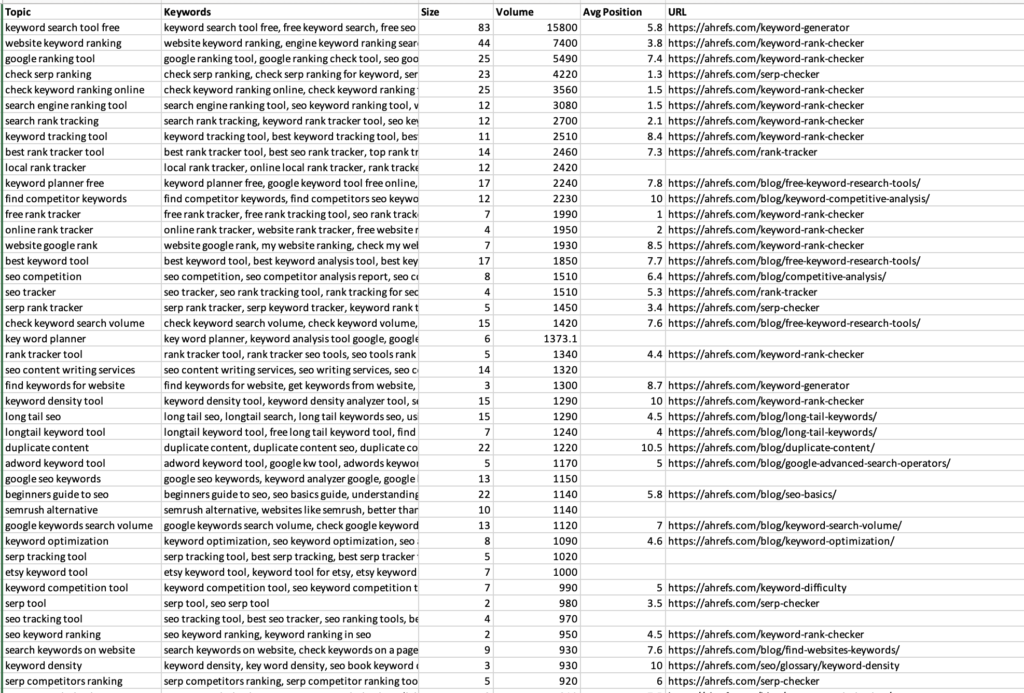
Evaluate the ease-of-use and learning curve
An SEO topical map tool aims to automate the topic clustering process, especially when handling hundreds to thousands of keywords.
Imagine you now have to spend up to the time it would take you to create a topical map manually due to the long hours you spent understanding the software’s functionalities.
That’s a waste of time and energy!
An SEO topical map tool should be less technical and easy to use.
Also, a topical map tool should permit user changes. You should be able to reorganize the map based on your preferences and add to it.
Any SEO topical map tool that lacks the features discussed above is not worth investing in.
Now, let’s examine our results after testing five SEO topical map tools.
Our selection of the best free SEO topical map tools
We compared the best and free topical tools by creating a topical map with the keyword “best SEO tools” on all the tools.
Here is our review of each of the software:
Fatjoe – SEO topical map generator
Fatjoe instantly creates an SEO-optimized topical map for free by entering your main topic.
The result features a list of pillar topics alongside subheadings for each article.
Our test
We entered “best seo tools” in the search bar and clicked “Click to Generate.”
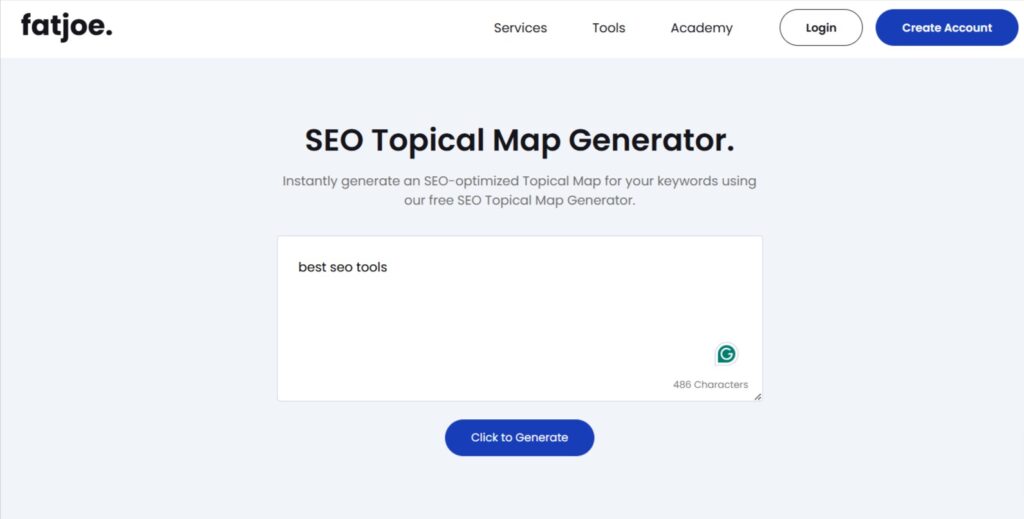
The result features ten pillar topics and subheadings in bulleted points for each topic, including “Introduction to SEO Tools,” “Keyword Research Tools,” “On-Page Optimization Tools,” and more.
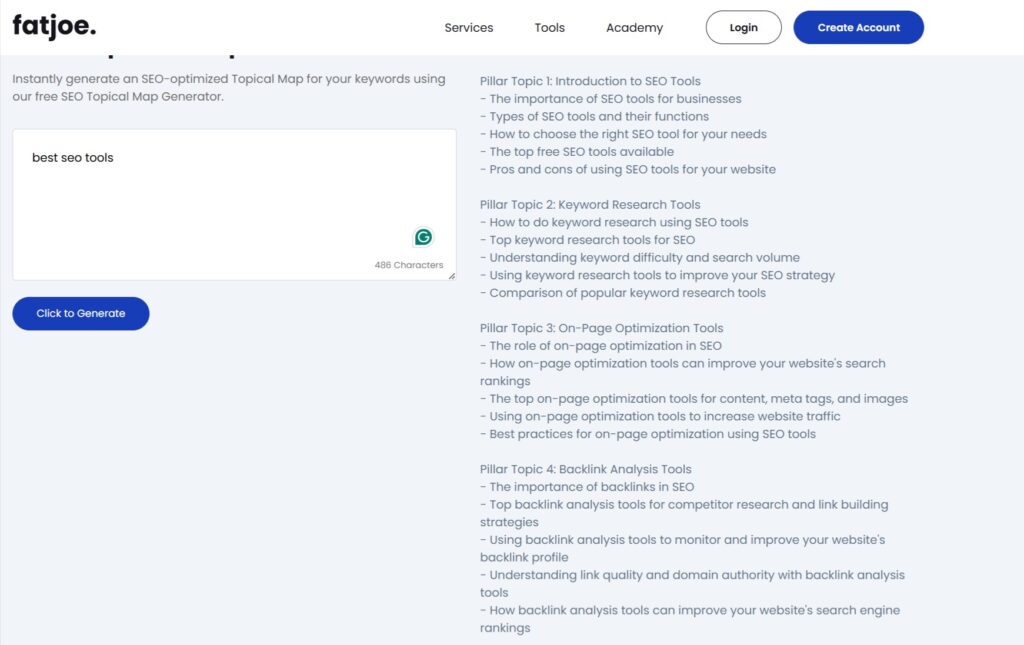
The tool also has a “Copy to Clipboard” icon below the result page, which allows you to copy the map.
Pros
- Easy to use
- No card is needed to start a free trial
- Generates results in one click
- Includes each topic’s subheadings
Cons
- Poor interface
- There is no way to upload multiple keywords
- No export to CSV or Excel feature
- Requires further keyword research on each topic
Akkio – SEO topical map generator powered by AI
Akkio is another free SEO topical map generator. It’s unique for its easy-to-use functionality.
Enter your primary keyword into the search bar, and the tool generates your topical map in seconds. The tool also has a copy icon at the top bar, which allows you to copy the result offline.
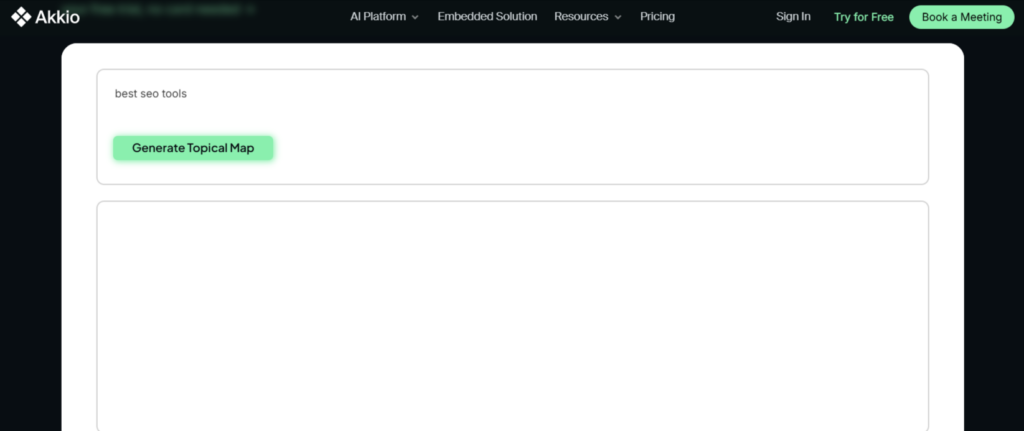
The tool provides internal linking, content gaps, and topical authority-building recommendations alongside its results.
Although Akkio SEO topical map generator is okay because it creates topic clusters, but the tool is nothing more than a prompt wrapper. The results aren’t different from what you’ll get with ChatGPT.
Our test
See what we had when we created a topic map on “best SEO tools.” The tool created five subtopics with a list of items under each subtopic.
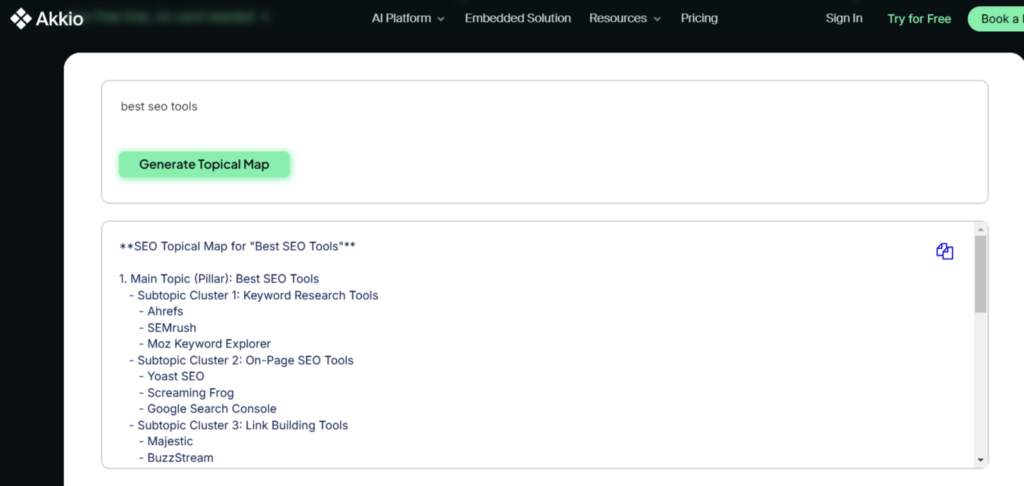
More so, the tool’s UI isn’t nice; the results are bullet points, making it difficult to understand.
Pros
- Easy to use
- No card is needed to start a free trial
- Generates results in one click
Cons
- Poor interface
- There is no way to upload multiple keywords
- No export to CSV or Excel feature
Optimo – Topical map generator
The Optimo topical map generator is similar to Akkio because it is easy to use. It generates topical maps with one click in seconds.
The tool is 100% free and allows you to generate topical maps as much as possible. Enter your keyword in the search bar and click “Click to Generate.”
Our test
We created a topical map with this tool on “best seo tools.”

The map includes pillar topics and a list of items to cover on each topic. However, the UI is not appealing; the map appears as bullet points.
More so, the map appears AI-generated. It’s nothing more than a ChatGPT result. You still need to research to find relevant subtopics and keywords to optimize.
Pros
- The tool is free and easy to use
- Features pillar topics for your core topic
Cons
- Requires further research
- There is no way to upload multiple keywords
- No export feature to CSV or Excel
AI Helperhub – Topical Map Creator
AI Helperbub stands out for its visualization and keyword list upload feature. Although its interface is a bit complex compared to other topical map tools discussed above. However, this software creates topical maps in visually stunning and informative representations.
You can upload up to 250 keywords in CSV format, choose your preferred visualization format (Force Directed or Radial Dendrogram), and click “Generate” to create your topical maps.
Note: The tool has a label settings feature on the sidebar that allows you to determine how the map appears.
You can also click the “Download as SVG” button to export the result as an SVG file.
Our test
Unlike other tools, the AI Helperhub organizes topics based on semantic similarity. We created a CSV file containing our primary topic and a few subtopics and uploaded it to the tool.
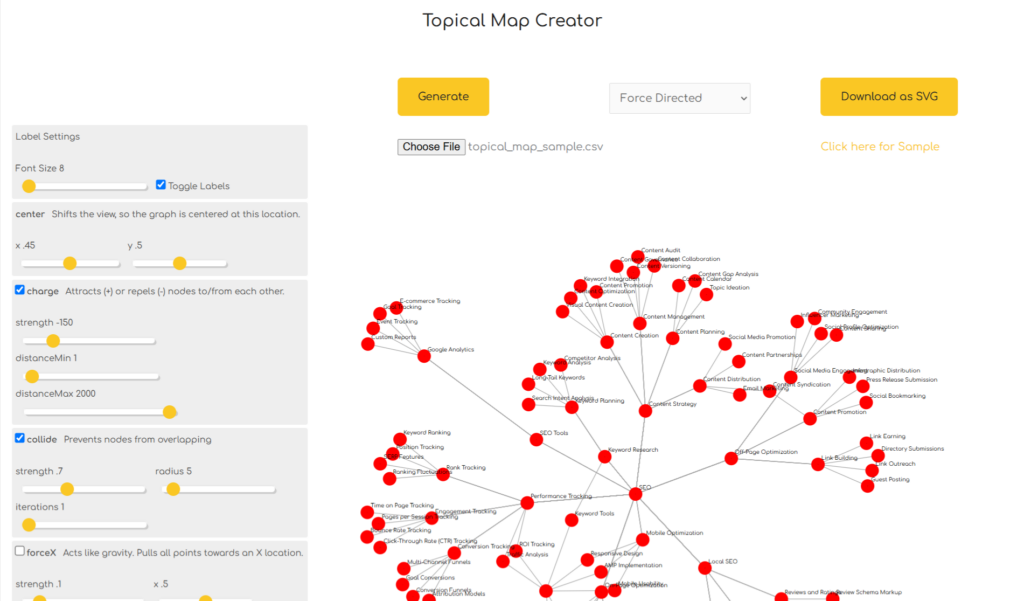
The tool created a topical map that included the main topic, a primary subtopic, and subsidiary keywords.
Pros
- Allows upload of multiple keywords
- Can export for offline purposes
- Group topics by semantic similarity
- Features different visualization formats
Cons
- It has a complex interface
- The label setting is a bit technical
LogicBalls – SEO Topical Map Generator
LogicBalls SEO topical map generator works more like an outline generator than an SEO topical mapping tool. It uses semantic-related subtopics as subheadings in the outline. With this tool, you can have an outline that covers everything about a topic and increase your authority for that search query.
Interestingly, the tool is easy to use. Enter your primary topic and click “Generate.” The tool creates the result in seconds.
LogicBalls also allows you to make suggestions to improve the result. Move your cursor to the section where you want to change and click the “Ask AI” option.
Lastly, you can copy, share, or download the outline in a PDF format.
Our test
We entered our primary topic, “best SEO tools,” into the search bar, and the tool generated an outline that included subheadings, including types of SEO tools, how to use SEO tools effectively, and more.
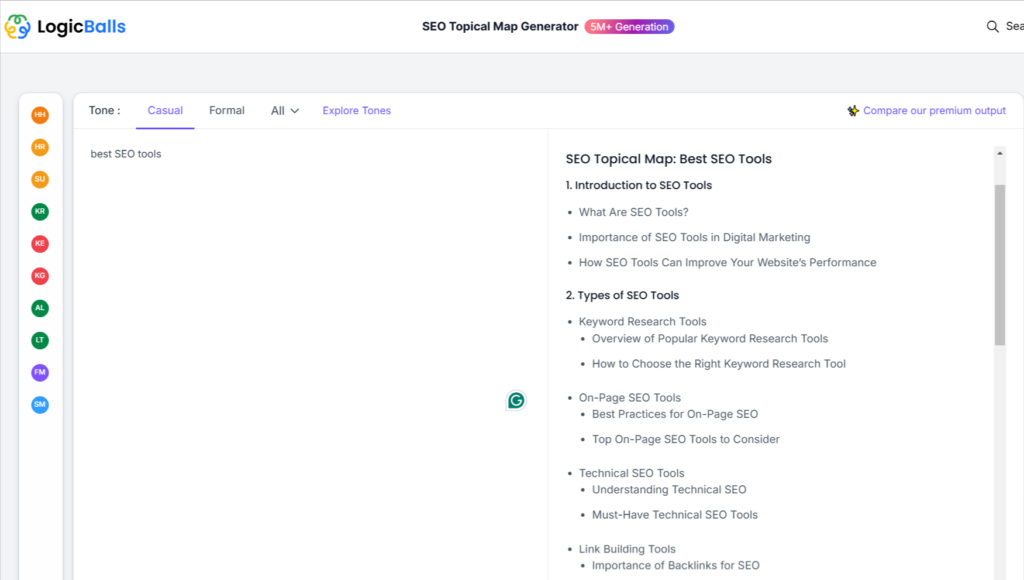
We clicked on the section we wanted to make changes and used the “Ask AI” feature to enter our desired change.

Pros
- It’s easy to use
- Users can make suggestions to improve results
Cons
- It doesn’t create a topic map
Free vs. paid topical map tools
Topical map tools should save you time. However, free tools often create more problems than they solve.
The number one reason free topical map tools fail is their clustering algorithm.
Earlier, we discussed how a grouping algorithm is crucial for finding the right topics and avoiding content cannibalization.
Free topical map tools use “semantic clustering.” As the name suggests, these tools group keywords solely based on their similarity in meaning.
While this approach isn’t entirely wrong, it overlooks a critical factor: user search intent.
These tools often fail to detect user intent, which can disrupt your content strategy.
You may create one article when you actually need two or three, or the other way around.
Grouping keywords based on intent is far more accurate. It helps identify opportunities for dedicated content around specific keywords.
Paid topical map tools are invaluable in this context. Advanced topical map tools utilize live SERP data to analyze keywords, providing a more accurate approach.
This allows you to see how keywords relate to each other in actual search results.
At thruuu, we provide an advanced keyword clustering tool designed to build high-quality topical maps.
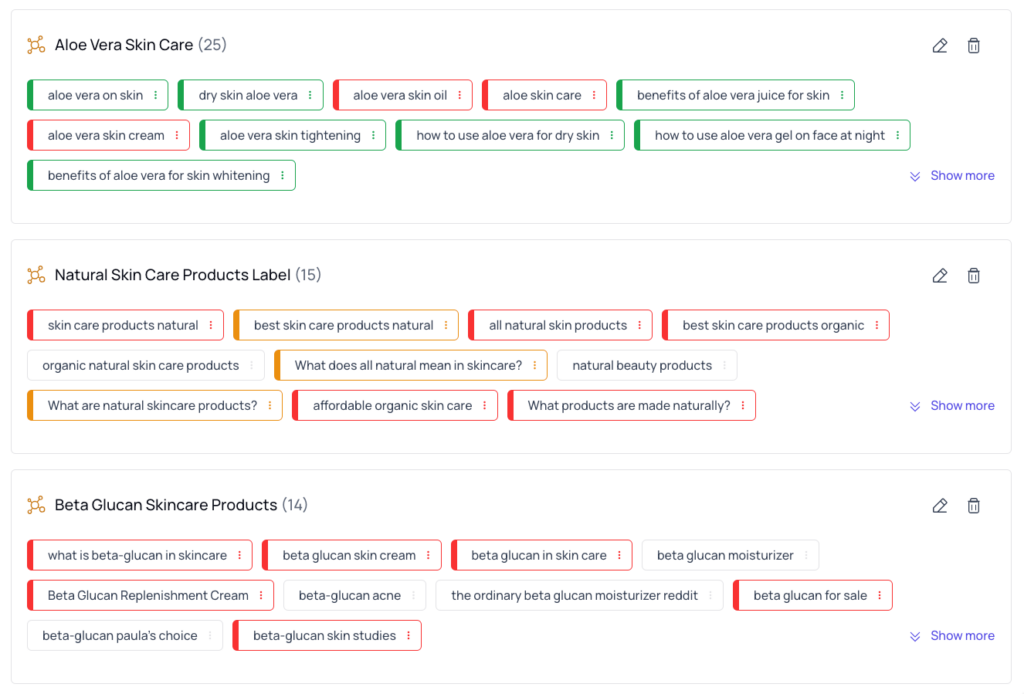
Our tool groups up to 15,000 keywords into clusters based on SERP similarity. Each cluster is then organized into categories, unveiling the full topical map.
You can easily navigate the interface and select your preferred topics. Each cluster represents a potential dedicated article.
Our users love the intuitive UI and the ability to generate tailored AI content briefs in just a few clicks from a keyword group.
Below is an article outline generated automatically with our Content Brief Generator.
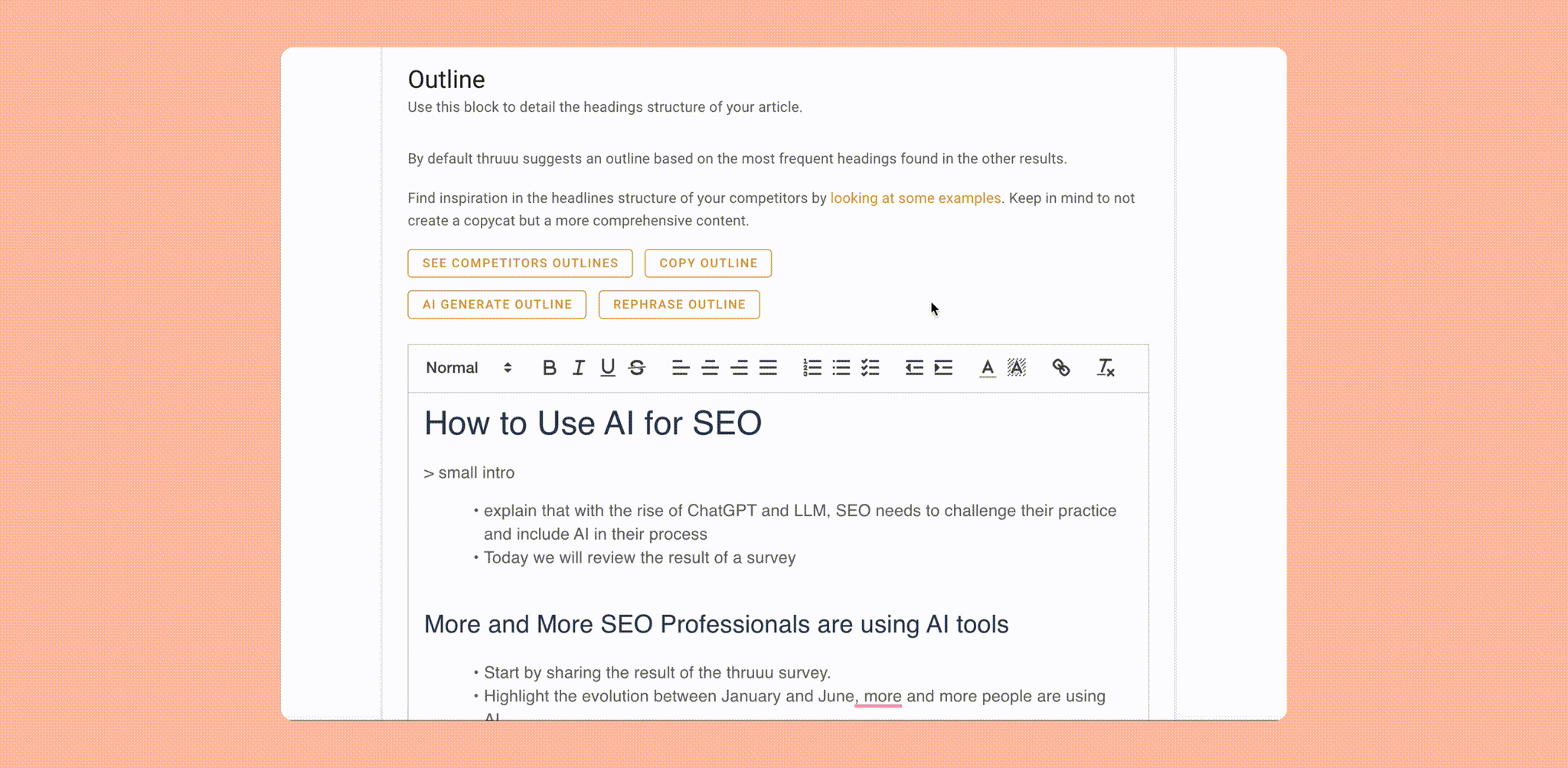
We take it a step further by extracting key competitor data from each cluster including word count, headings, frequently asked questions, and more.
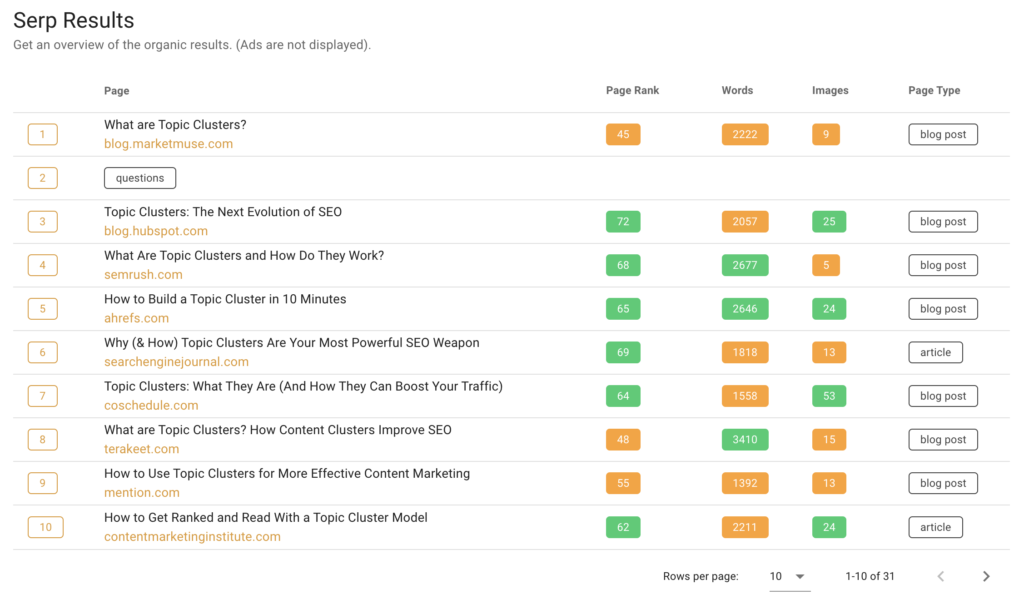
The best part?
We’re offering a free trial with 500 keywords, allowing you to experience our tool firsthand.
Start building a profitable content strategy today with our advanced keyword clustering tool!
Group 500 Keywords for Free
Our end-to-end content optimization solution empowers your team to crack the Google algorithm, craft exceptional content, and achieve remarkable organic search results.
How to use a topical map tool
Alright, so you’ve got your hands on a topical map tool. Let’s see how to make the most of the tool:
Identify your core topic
Your core topic is your seed keyword. It’s the broad, high-level term that represents your niche or topic. Consider it as the starting point for generating more specific, long-tail keywords.
For example, if you’re in the fitness industry, your core topic might be “weight loss“ or “strength training.” From there, keyword research tools can expand on it.
That takes us to the next action point.
Find related subtopics and keywords
It’s good to have a narrow list of short and long-tail keywords relevant to your core topic. A good keyword research tool can help you simplify this process.
For instance, you can use Google Search Console and filter by queries containing certain words to find variations of your target keyword. You can also use other keyword research tools like Google Keyword Planner, Google Trends, and more to expand your keyword list.
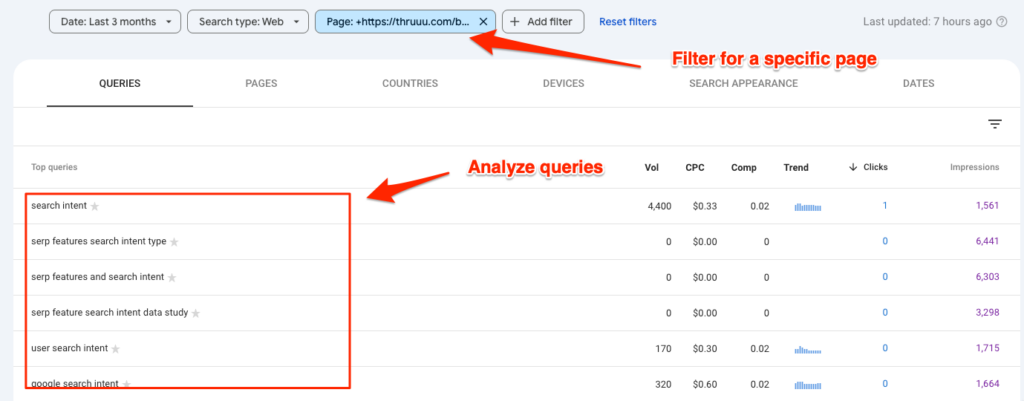
What’s next?
Map similar topics and keywords
Import your keyword list file into the topical map tool.
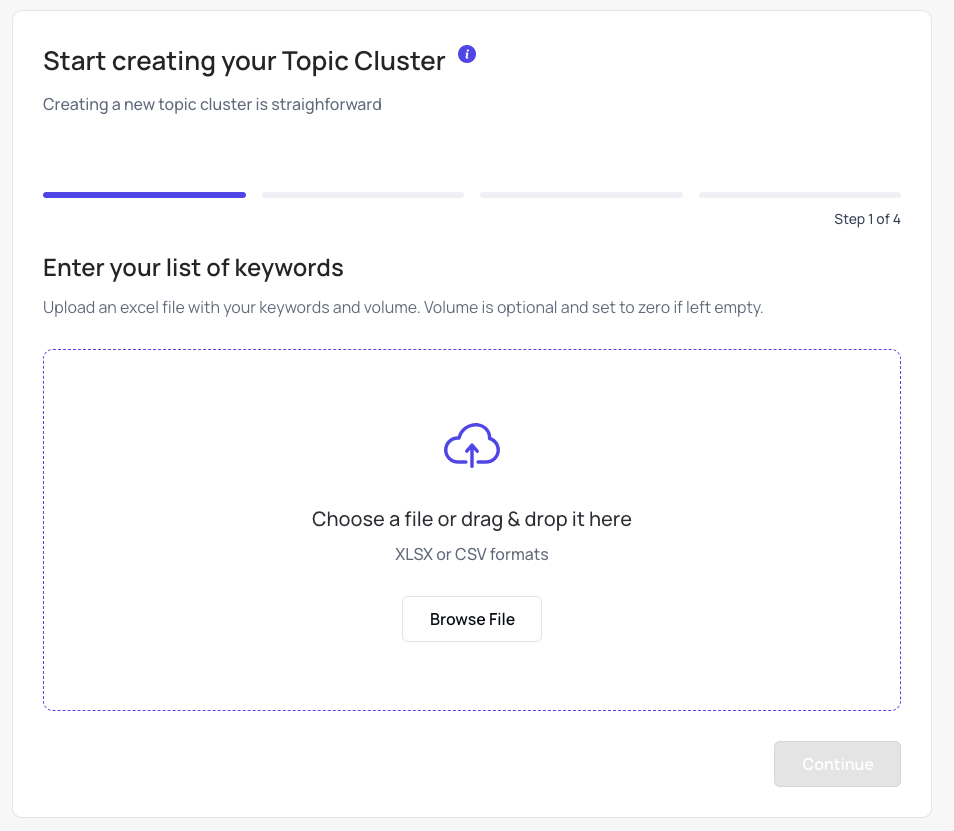
With thruuu, you can relax while it does the heavy lifting. The tool analyzes your keyword list and categorizes it based on SERP similarity. Thus, each group is a distinct topic with SERP-similar keywords.

Select the best topic and create a map
Not all topic maps created will be relevant to your site. Analyze the results and select the best topics with keywords that satisfy search intents.
Write one article per topic
Once your topical maps are ready, you can build topical authority with rich content.
Create one detailed article per topic and optimize the keywords in your content. Using thruuu, you can click on the “brief icon” below each topic to generate a well-structured brief.
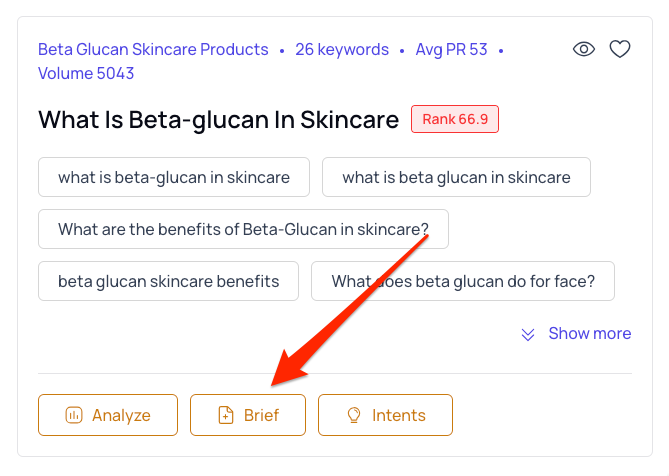
The briefs feature SERP insights, competitor analysis, content outline, and other relevant details that make creating top-notch content easy.
FAQ
Can I create an SEO topical map without any tools?
Yes, if you enjoy spending hours manually sorting through keywords, mapping connections on spreadsheets, and playing 4D chess with Google’s algorithm!
But in all seriousness, while you can create a topical map without tools, it’s time-consuming and prone to errors.
SEO topical map tools can enhance the accuracy and efficiency of the mapping process.
How do SEO topical maps improve search visibility?
SEO topical maps help identify content gaps, generate ideas for related content, and showcase topical authority, which can lead to improved rankings and visibility in search engines.
Most importantly, SEO topical maps help improve your site’s internal linking structure, which is a crucial ranking factor. As you create individual pages, you can link them to one another with relevant anchor texts.
Can I use ChatGPT to create topical maps?
ChatGPT can create topical maps, but it won’t use data from SERPs. It groups topics only by semantic similarity but not by SERP similarity.
It can’t analyze top-ranking pages, People Also Ask questions, Related Searches, and more on search results to determine keyword gaps.
Empower Your Content Team
Our end-to-end content optimization solution empowers your team to crack the Google algorithm, craft exceptional content, and achieve remarkable organic search results.
